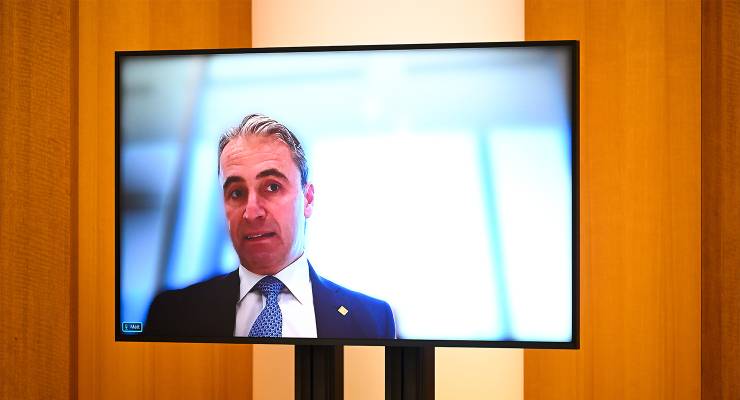
If you can rely on one thing with Australia’s banking oligopoly, it’s that they will demand to be allowed to engage in riskier lending despite having to be repeatedly saved from the consequences of such lending, knowing taxpayers will never let them fail. They even tried that stunt on Wayne Swan as the financial crisis began wreaking havoc across the globe 15 years ago, and now they’re at it again.
After using the Reserve Bank’s punitive interest rate hikes to fatten themselves over the past 18 months, the big four banks are hoping politicians and voters will forget about what happened last time they were allowed to do what they wanted — which resulted in scandal after scandal, a royal commission and billions in compensation for outrages such as charging dead people and fees for no service.
Of course, the latest push for less lending regulation from the likes of Commonwealth’s Matt Comyn and outgoing NAB boss Ross McEwan is being dressed up as being for the good of consumers and the broader economy — not banks. The big four really just want to stop people from being forced into the clutches of payday lenders and other unsavoury types. The “pendulum has swung too far on banking regulation”, say McEwan — cheered on, naturally, by the business press.
A generous interpretation of the latest demand for banks to engage in riskier lending is that they’ve forgotten about the federal government and the Reserve Bank bailing them out during the financial crisis, with guarantees for debts for three years and on deposits up to $250,000 permanently, and again during the pandemic when the RBA came to their assistance with a term funding facility. The second time came only a year after the banks’ real, exploitative natures were exposed by the Hayne banking and financial services royal commission.
But the real story about the call for more risk and less regulation isn’t about the freedom to lend money to customers and be innovative — it’s about preparing the ground for weak earnings and revenue growth over the next year or so. In tightening monetary policy, the Reserve Bank boosted bank revenues via higher variable rates on home loan mortgages while failing to increase borrowing rates for customers by the same amount. The old adage is that bank loan costs are faster to rise and slow to fall, while deposit rates are slow to rise and quick to fall — AKA the great net interest margin rort. It’s great for bank profits, as recent results have shown — and the bonuses of CEOs and bank executives.
But now that impetus has all but dried up with the RBA set to leave rates where they are for much of this year. Deprived of their source of easy profit growth, the banks are looking for alternatives. They want to cut branch costs but are running into political opposition to branch closures, especially in regional areas and the outer suburbs of the major cities. They’re also trying to end the use of cash, encouraging the use of online banking (which comes with greater fraud risks and cybersecurity costs) and contactless payments.
The other alternative: get rid of the regulations that have delivered an “unquestionably strong” banking system since the Murray inquiry a decade ago.
For good measure, the bank CEOs are throwing in some gratuitous reform advice, led by CBA’s Comyn, who was happy this week to lecture us on “international competitiveness, dynamism and supporting both the mobility of labour and capital”. Comyn wants income tax for people earning up to $300,000 to be cut to 30%, the GST increased and tech giants (who are payments competitors with the banks) slapped with a levy.
Gotta admire the big business lobby’s obsession with a punitive increase in the GST while the rich enjoy a tax cut.
But Westpac’s Peter King, backed by Comyn, had some more reform advice: there are too many elections and we need fewer of them so that we can have reform and “certainty” for business. That’s right — what you may think of as democracy is really just risk and uncertainty for much put-upon big business, and we need less of it. As we’ve previously noted, big business is suddenly enamoured by four-year terms because they think reforms hated by voters are more likely to succeed if they can’t vote as often.
Of course the banks want less democracy. Democracy is the reason why they ended up being humiliated en masse at the banking royal commission, which was the result of relentless political pressure on then prime minister Malcolm Turnbull and his treasurer Scott Morrison to do something about the outrageous misconduct of the banks. No wonder the big banks want to take voters out of the picture.









Maybe it time we took the “Commonwealth” out of the Commonwealth Bank and restored to where it should be by creating a Commonwealth owned Bank.
Nationalise the National Australia Bank perhaps?
Well done with your summary of the banks and their never ending greed.
Great article. The banks haven’t forgotten the findings of the Royal Commission. They’ve just been protected from the recommendations and any real consequences. Now they know they can get away with it, they’re pushing for more.
The demand by business for ‘certainty’ discloses the real business of business: get the government to ‘guarantee’ profit. However, the justification for capitalism is that profit is the reward for assuming risk and managing it better than competitors. We have stupidly adopted a delusion that certainty can be guaranteed and it cannot.
The dirty rotten private banking system of Australia and its paramour The Reserve Bank, are the primary sources of all the current social problems that are all running rife across Australia, kings don’t loose sleep over the opinions of peasants. Of course, equally bad are the derelicts and deadheaded bubble headed boobies that largely inhabit our two federal Houses of Parliament. Oh, the pain, the pain.